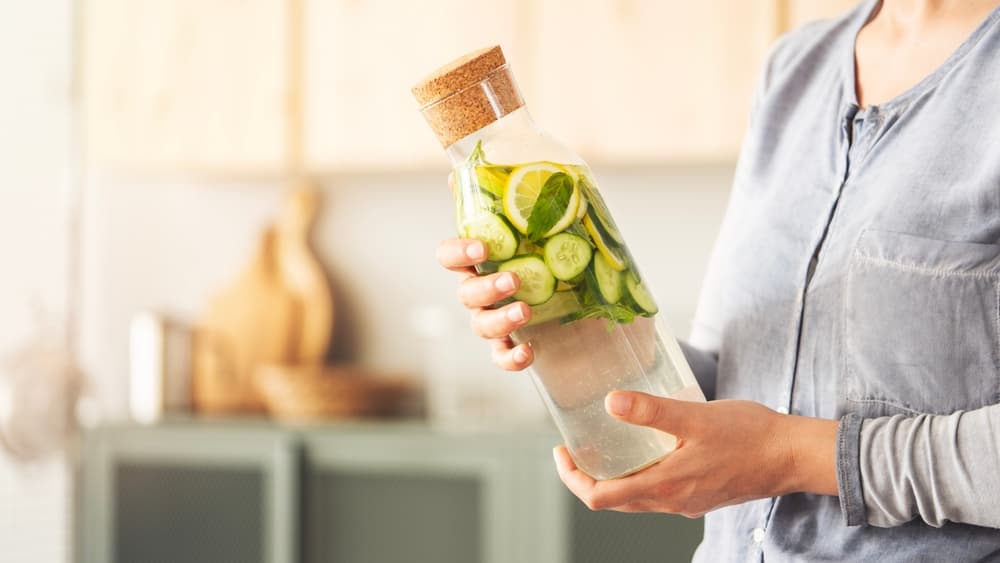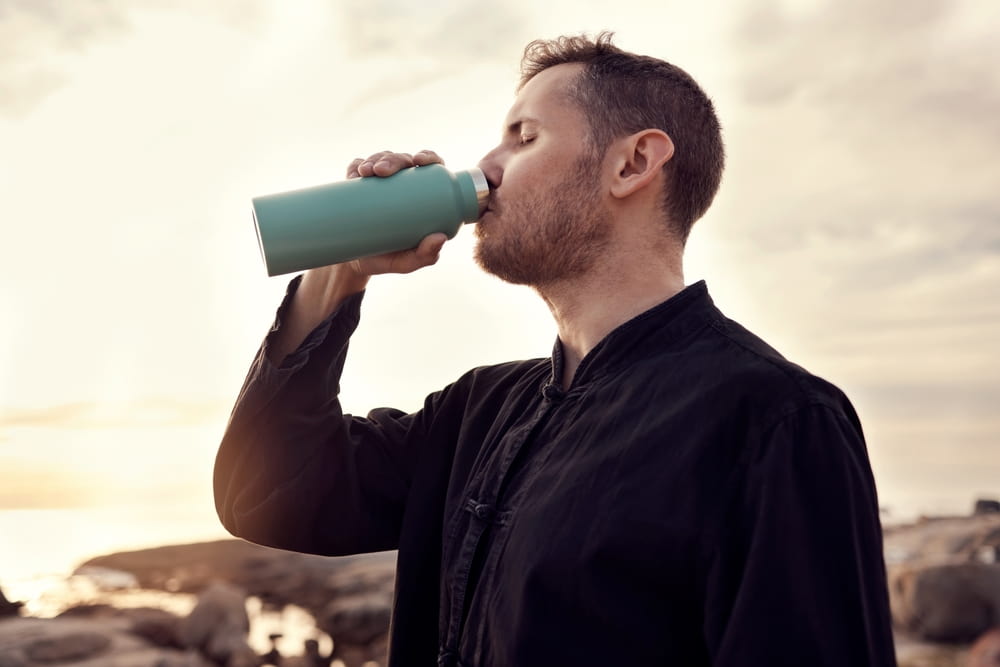The importance of staying hydrated for overall health


The Importance of Staying Hydrated for Overall Health this topic is critical in our daily lives. Every cell, tissue, and organ of our body needs enough water to function correctly. From maintaining physical strength to regulating body temperature, keeping the digestive process active, everything depends on proper hydration.
However, in busy lives, many people unknowingly suffer from mild dehydration, which can lead to fatigue, headaches, reduced concentration, and reduced physical performance. Therefore, drinking water only when thirsty is not enough, but the habit of drinking water regularly and adequately is the key to overall well-being. If you are properly hydrated, your body will function more strongly, fresher, and healthier.
According to Mayo Clinic, staying hydrated helps maintain proper body temperature, joint lubrication, and overall cellular function.
Why is drinking water essential?
Basic components of the body


Physical structure: A large part of our total body weight (about 50% to 65% in adults) is water. It is the primary foundation of cells, tissues, and organs.
Cellular function: Every cell needs water to function correctly. Without water, nutrients cannot reach cells, and waste products cannot be removed.
Temperature regulation
Maintaining normal body temperature: Water acts as a thermostat, regulating body temperature. When the environment is hot or when you exercise, the body releases water through sweat. This sweat absorbs excess heat from the body as it evaporates, keeping the body cool.
Transport and supply of nutrients
Carrier of nutrients: Blood is about 90% water. This water carries vitamins, minerals, and glucose from food to every cell in the body, which is essential for energy.
Oxygen supply: Blood carries oxygen from the lungs to the rest of the body.
Elimination of waste products
Kidney function: Water helps the kidneys filter waste products, such as urea and toxins, from the blood and eliminate them through urine. Drinking enough water reduces the risk of kidney stones.
Defecation: It smooths the digestive process and helps prevent constipation.
Joint protection and lubrication
Shock cushioning: Water acts as a lubricant and shock absorber for joints, eyes, the spinal cord, and the brain, helping protect against friction and injury.
Health benefits of hydration
Increased brain function and mental health
Improved attention and memory: Even mild dehydration can reduce brain function. Drinking enough water improves attention, alertness, and short-term memory.
Mood control: It helps regulate mood and reduce anxiety and irritability.
Prevent headaches: Dehydration is often a cause of migraines and other common headaches. Drinking water regularly can prevent such headaches.
Physical energy and performance
Reduce fatigue: Adequate water helps produce energy at the cellular level, thereby eliminating fatigue and lethargy.
Helps with exercise: Water lubricates muscles and joints and helps maintain body temperature during physical activity, both of which are essential for peak performance.
Digestive process and metabolism
Prevents constipation: Water keeps the digestive tract moving and softens stool, helping prevent constipation and promoting regular bowel movements.
Nutrient absorption: It helps to digest food and absorb nutrients into the blood.
Weight control: Drinking water creates a feeling of fullness in the stomach, which prevents overeating. Drinking cold water requires the body to burn some calories to heat it, which can slightly increase metabolism.
Healthy skin and beauty
Skin radiance: Adequate hydration keeps the skin moist and refreshed from the inside. It maintains the skin’s elasticity, making it look tight and radiant.
Detoxification: Drinking water helps remove toxins, which can indirectly help reduce skin problems (such as acne).
Immunity and disease prevention
Detoxification: It helps in strengthening the immune system by quickly removing toxins and waste products from the body.
Disease prevention: Drinking enough water during illness (such as fever or flu) helps control body temperature and speed recovery.
Learn More: The benefits of drinking warm water in the morning
Joint and kidney health
Joint lubricant: Water keeps joint cartilage moist and smooth, reducing pain and facilitating movement.
Kidney Protection: Helps the kidneys function effectively and reduces the risk of kidney stones by reducing the accumulation of minerals and salts in the urine.
Dangers of Dehydration
Early Physical Symptoms and Decreased Performance
Extreme Thirst: This is the first and most obvious sign of dehydration.
Fatigue and Weakness: Lack of water prevents the body’s cells from producing energy, resulting in rapid fatigue and difficulty concentrating on daily tasks.
Changes in Urine: The amount of urine decreases, and the color becomes dark yellow or amber.
Dry Skin and Mouth: The skin may become dry, wrinkled, or lose elasticity. Lips become dry, and the mouth becomes sticky.
Headaches and Dizziness: Brain tissue shrinks slightly, leading to headaches and dizziness. Low blood pressure can cause dizziness or lightheadedness.
Brain and Mental Dangers
Cognitive Impairment: Severe dehydration severely impairs attention, memory, and decision-making.
Mood Changes: Dehydration increases irritability, confusion, and restlessness.
Reduced consciousness: In severe dehydration, the patient may slur their words or become unconscious.
Heat illness
Heat cramps: Dehydration prevents the body from sweating and regulating temperature properly, leading to painful muscle cramps.
Heat exhaustion: characterized by weakness, nausea, a rapid, weak pulse, and excessive sweating.
Heatstroke: This is the most serious condition, where the body temperature rises dangerously and internal organs begin to be damaged. It can be fatal if not treated quickly.
Important physical complications
Kidney damage: Long-term or severe dehydration increases the risk of urinary tract infections, kidney stones, and end-stage kidney failure.
Cleveland Clinic notes that drinking enough water boosts energy and supports healthy kidneys.
Low blood pressure: Low body fluid levels can cause blood pressure to drop dangerously low, leading to shock.
Electrolyte imbalance: Water maintains the balance of sodium and potassium in the blood. Dehydration disrupts this balance, which can disrupt the functioning of the heart and nervous system.
Daily water needs and tips
General daily water needs
The most well-known and simple rule for daily water intake is:
The 8 x 8 rule: You should drink at least eight (8) glasses (about 8 ounces or about 240 milliliters each) of water daily. This means drinking about 2 liters of water daily.
However, this amount is only a general guideline. Your actual needs will depend on the following factors:
Physical activity: During strenuous exercise or physical labor, the body loses excess water through sweating. In that case, you should drink an additional 1-2 glasses of water for every 30 minutes of exercise.
Climate and environment: In hot or humid weather, the body’s water needs are much higher because the body sweats more to keep itself cool.
Health conditions: The body loses water quickly when it has a fever, vomiting, or diarrhea. Water needs also increase during pregnancy or breastfeeding.
Weight and age: In general, the higher the body weight, the greater the water needs.
Sources of hydration
While drinking water is the primary source of hydration, remember that about 20% of the total water requirement comes from food.
Water-rich foods: Fruits and vegetables such as watermelon, cucumber, tomatoes, strawberries, lettuce, and oranges are high in water.
Beverages: In addition to plain water, herbal teas, coconut water, and low-sugar fruit juices also help with hydration.
Important note: Sugary drinks (such as soft drinks), excess caffeine (such as coffee), and alcohol can dehydrate the body. Therefore, they are not a substitute for water.
Easy Tips to Stay Hydrated


Here are some effective strategies to make regular water drinking a habit:
Keep it with you at all times: Keep a reusable water bottle at your desk or in your bag. It’s easy to remember to drink.
Create a schedule: Set reminders or create a routine to drink water at specific times (e.g., after waking up, before each meal, and before bed).
Add flavor: If the taste of water alone doesn’t appeal to you, try making detox water with lemon, cucumber, mint, or berries.
Drink with meals: Drinking a glass of water before meals can help aid digestion and reduce calorie intake.
Before, during, and after exercise: Drink water shortly before exercise, take small sips during breaks during exercise, and replenish lost fluids after exercise.
When discussing The Importance of Staying Hydrated for Overall Health, one thing is clear: water is not just a way to quench thirst, but it is a key part of maintaining our body’s well-being. Drinking enough water improves energy, concentration, digestion, skin, and overall physical performance.
FAQ
Q. How much water should I drink daily?
Most adults need about 6-8 glasses (1.5-2 liters) of water per day. Your needs may increase if you exercise, live in a hot climate, or sweat a lot. Light-colored urine is usually a sign of good hydration.
Q. The importance of staying hydrated
Staying hydrated helps your body regulate temperature, support digestion, transport nutrients, and remove toxins. Even mild dehydration can cause fatigue, headaches, and poor focus.
Q. Benefits of staying hydrated
Proper hydration boosts energy, improves digestion, supports healthy skin, protects your joints, and enhances overall physical performance. It also helps your body stay balanced and healthy throughout the day.
Key takeway The importance of staying hydrated for overall health
A little awareness throughout the day, such as drinking water regularly, eating high-water content foods, and paying attention to signs of dehydration, can significantly improve your health. So, small daily hydration habits make a big difference in the long run.
So, make drinking water a priority today to maintain your well-being. The Importance of Staying Hydrated for Overall Health is not just a topic; it is one of the easiest ways to stay healthy in your daily life.









